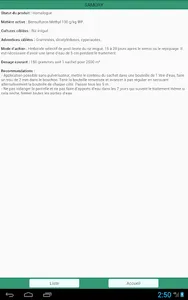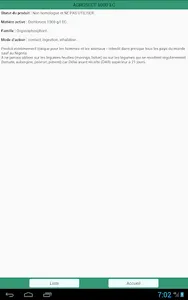This application presents the phytosanitary products (insecticides and acaricides, herbicides, fungicides) which are on sale in Niger or used by agricultural producers. It was established by the Regional Chambers of Agriculture of Niger, the National Network of Chambers of Agriculture and also producers who are members of WhatsApp groups, who take photos of the products offered to them to find out if they are approved and also how to use them. Only approved products are authorized on Nigerien territory.
The list includes products approved by the Sahelian Pesticides Committee (CSP) for use on crops in Niger and products not approved by the CSP. As of November 1, 2022, the list includes 373 commercial products including 250 insecticides or acaricides, 101 herbicides and 22 fungicides. This list is not exhaustive given the great diversity of supplies by individual circuits from Nigeria and other border countries (Burkina, Benin and also Libya). It must be updated regularly to take into account new products that arrive on the market.
To use the app, start by choosing the type of pesticide you want to check (insecticides and acaricides, herbicides or fungicides). Then type the commercial name of the product to access its file or scroll down the list to choose the product you are interested in. Typically, the trade name appears large on the top of the label. Each sheet first tells you the status of the product, i.e. whether it is approved in Niger, not approved or prohibited. You can also know where the active ingredients of the product and their family, the targeted pests, the crops concerned and the modes of action, the current dosage and the safety criteria (time before harvest and time before returning to the plot) .
The basic advice remains to buy whenever possible products approved by the Sahelian Pesticides Committee. Approved products can be found in almost all regions today, at least in urban centres. A registered pesticide is a product whose sale and use has been approved for sale and use by the competent national or regional authorities, after examination of complete scientific data showing that the product contributes effectively to the stated objectives and does not present unacceptable risks to human health. and animal or for the environment.
Knowledge of non-approved products allows agricultural advisers to better advise agricultural producers, to see if the product is suitable for the pests encountered, to offer them approved replacement products, but also alternative measures to pesticides if they exist.
The list includes products approved by the Sahelian Pesticides Committee (CSP) for use on crops in Niger and products not approved by the CSP. As of November 1, 2022, the list includes 373 commercial products including 250 insecticides or acaricides, 101 herbicides and 22 fungicides. This list is not exhaustive given the great diversity of supplies by individual circuits from Nigeria and other border countries (Burkina, Benin and also Libya). It must be updated regularly to take into account new products that arrive on the market.
To use the app, start by choosing the type of pesticide you want to check (insecticides and acaricides, herbicides or fungicides). Then type the commercial name of the product to access its file or scroll down the list to choose the product you are interested in. Typically, the trade name appears large on the top of the label. Each sheet first tells you the status of the product, i.e. whether it is approved in Niger, not approved or prohibited. You can also know where the active ingredients of the product and their family, the targeted pests, the crops concerned and the modes of action, the current dosage and the safety criteria (time before harvest and time before returning to the plot) .
The basic advice remains to buy whenever possible products approved by the Sahelian Pesticides Committee. Approved products can be found in almost all regions today, at least in urban centres. A registered pesticide is a product whose sale and use has been approved for sale and use by the competent national or regional authorities, after examination of complete scientific data showing that the product contributes effectively to the stated objectives and does not present unacceptable risks to human health. and animal or for the environment.
Knowledge of non-approved products allows agricultural advisers to better advise agricultural producers, to see if the product is suitable for the pests encountered, to offer them approved replacement products, but also alternative measures to pesticides if they exist.
Show More






















